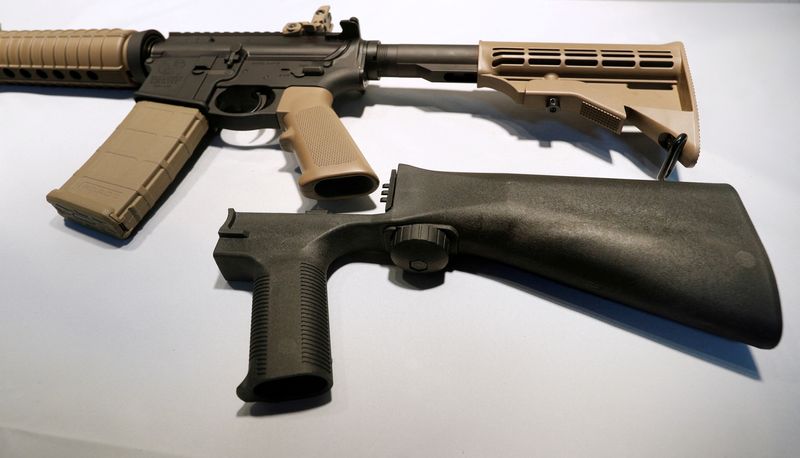By Andrew Chung
WASHINGTON (Reuters) -The U.S. Supreme Court on Monday turned away another challenge to a federal ban imposed under former President Donald Trump on devices called "bump stocks" that enable a semi-automatic weapon to fire like a machine gun.
The justices declined to review an appeal by a group of firearms dealers and individuals in Minnesota, Texas and Kentucky after a lower court rejected their argument that the government had violated the U.S. Constitution's Fifth Amendment "takings clause" by effectively taking their private property without just compensation.
Trump's administration moved to reclassify bump stocks as machine guns, which are forbidden under U.S. law, in a rare firearms control measure prompted by a 2017 mass shooting in Las Vegas. The Supreme Court in 2019 declined to block the ban from going into effect. The justices last month rejected appeals by a Utah gun lobbyist and firearms rights groups of lower court rulings upholding the ban as a reasonable interpretation of a federal law prohibiting machine gun possession.
Bump stocks use a gun's recoil to bump its trigger, enabling a semiautomatic weapon to fire hundreds of rounds per minute to let it shoot like a machine gun. Trump pledged to ban them after a gunman used semiautomatic weapons outfitted with bump stocks in a shooting spree that killed 58 people at a country music festival in Las Vegas.
The Bureau of Alcohol, Tobacco, Firearms and Explosives (ATF), a U.S. Justice Department agency, reversed a previous conclusion and classified bump stocks as machine guns under a 1934 U.S. law called the National Firearms Act. The policy took effect in 2019.
Two sets of plaintiffs filed lawsuits seeking compensation for having to destroy or surrender their bump stocks in the Court of Federal Claims, which hears monetary claims against the U.S. government. A judge dismissed the actions, finding the policy to be a lawful exercise of the federal government's power to outlaw dangers to public health and safety.
The Washington-based U.S. Court of Appeals for the Federal Circuit upheld those decisions last year for a different reason, ruling that a property right in the devices was inherently limited given the existing federal prohibition on machine guns.

In a nation divided over how to limit firearms violence, gun rights are becoming increasingly expansive. Legal experts have said a variety of gun control measures are at risk since the Supreme Court's landmark ruling in June recognizing for the first time a right to carry a handgun in public for self-defense under the Constitution's Second Amendment guarantee of the right to keep and bear arms.
That ruling, powered by the court's 6-3 conservative majority, struck down New York state limits on carrying concealed handguns outside the home.